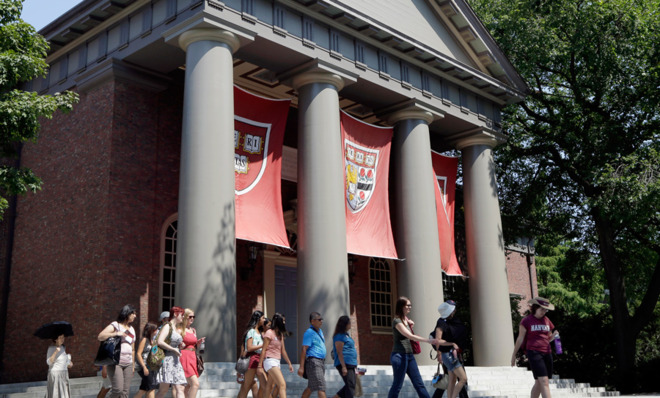The end of academic freedom?
A provocative essay in the Harvard Crimson has called on universities to boycott research that promotes "oppression"


A free daily email with the biggest news stories of the day – and the best features from TheWeek.com
You are now subscribed
Your newsletter sign-up was successful
We seem to be living through one of those moments when university campuses go a little bit nuts, generating enormous amounts of bad press for themselves. This first happened in the late 1960s, when the free speech, civil rights, and anti-war protest movements became radicalized, inspiring widespread acts of vandalism and violence. It happened again, in much more muted form, in the 1990s, when several colleges adopted speech codes designed to police forms of expression that were deemed "politically incorrect" (a term popularized by critics of the trend).
And now, in what looks like a sequel to the controversies of 20 years ago, professors and students at various campuses are going further, trying to exclude (or heavily regulate) politically unpopular or controversial ideas in the classroom and even purge them from professors' publications. The latter proposal — published by a Harvard undergraduate named Sandra Korn in the Harvard Crimson — is noteworthy because it explicitly calls for the abandonment of the ideal of academic freedom in favor of what the author calls "academic justice."
Here's Korn:
The Week
Escape your echo chamber. Get the facts behind the news, plus analysis from multiple perspectives.

Sign up for The Week's Free Newsletters
From our morning news briefing to a weekly Good News Newsletter, get the best of The Week delivered directly to your inbox.
From our morning news briefing to a weekly Good News Newsletter, get the best of The Week delivered directly to your inbox.
If our university community opposes racism, sexism, and heterosexism, why should we put up with research that counters our goals simply in the name of "academic freedom"?
Instead, I would like to propose a more rigorous standard: One of "academic justice." When an academic community observes research promoting or justifying oppression, it should ensure that this research does not continue. [Harvard Crimson]
This, in turn, has provoked predictable outcries. Students today are such wimps! Korn is a spoiled rich kid! She's proposing a form of "academic totalitarianism"!
My friend Patrick Deneen, writing in The American Conservative, takes a more provocative and illuminating position, agreeing with Korn that universities should value justice over freedom, but disagreeing with her about the content of justice. Whereas Korn upholds a standard of justice derived from the left-liberal convictions that already dominate the Harvard faculty and student body, Deneen believes that Roman Catholic universities (like his own Notre Dame) should require faculty and students to abide by the vision of justice espoused by the magisterium of the Roman Catholic Church.
Deneen's suggestion is illuminating because it clarifies precisely what Korn has in mind, which is a form of sectarianism. I employ the term in a purely descriptive sense, not a derogatory one. A sect is a community devoted to a specific vision of justice; the sect enforces this vision and imposes it on its members, including when they pursue other ideals. One of those other ideals is the pursuit of truth.
Where I think Deneen goes wrong is in attempting to show that Korn's vision of left-liberal sectarianism is somehow an outgrowth of the ideal of academic freedom itself, which he rightly traces back to John Stuart Mill's On Liberty. This is unconvincing. Mill's vision of freedom differs from all forms of sectarianism — left-liberal, Catholic, or whatever — in placing the open-ended pursuit of truth above moral considerations, including justice (in all of its clashing, contentious senses).
A free daily email with the biggest news stories of the day – and the best features from TheWeek.com
When a university ostensibly devoted to academic freedom actually has very little diversity of opinion, that is evidence that it has failed to live up to the ideal of academic freedom, not a sign that it has fulfilled its concealed aim of stamping out nonliberal points of view, as Deneen implies.
This very much includes Harvard itself. As Deneen notes, the only member of the Harvard faculty Korn singles out for opprobrium is the conservative octogenarian professor of government Harvey C. Mansfield. Which implies that Harvard has already gone a long way toward abandoning the ideal of academic freedom and adopting (de facto) the ideal of academic justice in its place.
A sectarian university is not an oxymoron. In many areas, it can be perfectly compatible with faculty members pursuing rich and robust research agendas. And there are certainly reasons why parents might prefer to send their children to one form of sectarian educational institution or another instead of a classically liberal university devoted to academic freedom.
But that doesn't mean that such classically liberal institutions aren't worthwhile. They are. In fact, I'd say that the value of such institutions lies precisely in their willingness to place the pursuit of truth above goods that sometimes conflict with it, including justice. Our understanding of ourselves and the world around us depends on the existence of such institutions and the work that they do.
What universities need is not more single-minded devotion to justice, however defined. It's more dedication to the open-ended pursuit of truth — and the toleration of genuine intellectual diversity that makes it possible.
Damon Linker is a senior correspondent at TheWeek.com. He is also a former contributing editor at The New Republic and the author of The Theocons and The Religious Test.
